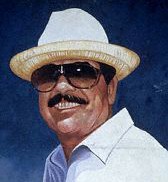
'Hussein in power as the media war retreats' - Dead Yankee Drawl

'Hussein in power as the media war retreats' - Dead Yankee Drawl
SADDAM HUSSAIN
(born 1937). After Saddam Hussein became president of Iraq in 1979, he proved to be one of the most brutal and warlike of late-20th-century political figures. In 1980 he launched his country into an eight-year war with neighboring Iran that neither nation could win. In 1991 his armies invaded and annexed tiny Kuwait. This aggression caused a massive United Nations coalition to attack Hussein's forces in January 1991 and defeat them decisively in six weeks. Hussein also used his armed might against his own people, especially the minority Kurds in the north.
Hussein was born to a peasant family in the village of Tikrit on April 28, 1937. Orphaned early in life, he was raised for a time by an uncle. In his youth he became an ardent nationalist, determined to rid Iraq of foreign influences. Soon after moving to Baghdad in 1955 he joined the Ba'th Socialist party. In 1958 he took part in the coup that overthrew the monarchy and made Abdul Karim Kassem prime minister. After trying to kill Kassem, Hussein fled Iraq for Syria, then to Egypt. There he studied law and came under the powerful influence of Gamel Abdel Nasser (see Nasser). When Kassem was overthrown in 1963 he returned to Baghdad and joined the Ba'th Party's new government, which lasted only a few months. He spent two years in prison. By 1966 he was free and a party leader.
In 1968 Saddam was called upon to help bring the Ba'th party back into power. Iraq's new president was Ahmed Hassan al-Bakr, but Hussein quickly became the most powerful individual in government. He became chairman of the Revolutionary Command Council and worked relentlessly to get rid of opponents and put his friends and family in positions of authority. His first goal was revitalizing the economy in order to build up his military power. He had gained enough control by 1979 to push Bakr aside and become president. His next goal was to make Iraq the leader of the Arab world.
Hussein's costly war with Iran led him to attack Kuwait to get hold of its oil fields and their revenue. This gamble lost when the United States and its allies attacked and defeated Iraq. At war's end, however, he remained in power, still determined to rebuild his military power for future use.